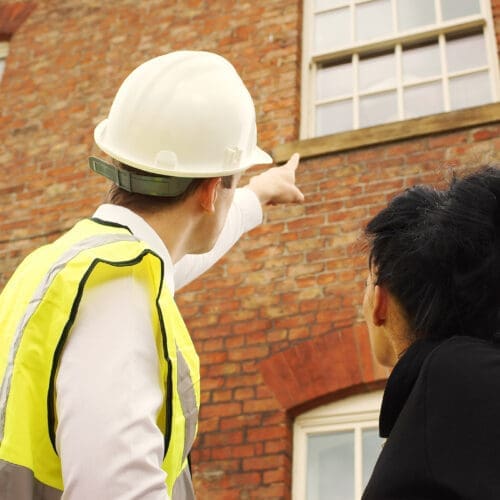RICS launches consultation on changes to the Homes Survey Standard
August 2025On 19 August 2025, RICS announced a public consultation (“the Consultation”) on proposed updates to the RICS Homes Survey Standard (“the Standard”).
The Standard sets out a framework for RICS members and regulated firms to follow when carrying out residential property surveys across the UK. This aims to ensure that high-quality standards are met consistently.
The first edition of the Standard was published in 2019 and implemented from 2021 onwards. This sets out three levels of surveys:
- Survey Level 1 – designed for buyers, sellers and owners seeking a visual inspection report on the condition of a property and does not advise on repairs or ongoing maintenance.
- Survey Level 2 – designed for complex or unique older properties. A visual inspection report which focuses on assessing the general condition of the main elements of a property and provides concise advice on repairs and any ongoing maintenance issues.
- Survey Level 3 – a detailed visual inspection of the property, its services and the grounds. This will include opening up concealed spaces such as roofs and basements, a detailed description of any defects and recommendations on any repairs required, and the consequences of not carrying out those repairs.
Once the consultation results have been considered, RICS will aim to publish the second version of the Standard in Autumn 2026.
Proposed changes
The Consultation sets out various potential changes to the Standard which include:
- New minimum requirements
The proposed changes state that each survey report must include the following:
- pre-service discussions between the RICS member and the client.
- agreement of the terms of engagement.
- appropriate desktop research.
- a diligent physical inspection by the signatory to the report, based on adequate local knowledge.
- report and advice following reflection on the condition of the property.
- any necessary post-report discussion between the parties including the client’s legal adviser.
It is also stated that RICS members should refuse to act in circumstances where they consider that the level of survey requested by the client is inappropriate. They should also take all reasonable steps to help potential clients understand the differences between the survey levels and the risks involved in commissioning the incorrect survey.
- Competence and experience
It is stated that suitably qualified RICS members (i.e., not a trainee) must physically inspect the Property. Trainees and candidates can assist with drafting the report but must be suitably supervised at all times and in no circumstances are able to sign the report.
Before the report is signed, the firm must be satisfied that the minimum requirements set out above are fulfilled, and be prepared to evidence this to RICS if required. This includes demonstrating that the signatory of the report has relevant local knowledge and experience.
The proposed changes suggest that a period of training and supervision should be undertaken to ensure that all RICS members are able to comply with the updates. RICS members are also subject to continuing CPD requirements.
- Carrying out the services
The updated Standard requires that when carrying out the inspection and report, the surveyor must ensure that:
- they have appropriate levels of PII.
- any software or technology used is compliant with the Standard.
- they accurately and adequately document the service at all stages and ensure there is a complete record. This should include relevant photographs and videos of the property.
- the inspecting surveyor has adequate levels of knowledge of the type of property and area the property is located.
- the client is aware of the scope and limitations of the Service.
- material information is requested from available parties (e.g. the vendor, occupier, agent) and other publicly available information (e.g. the planning portal) must be considered in the report.
- where opinion or advice from a third party is relied upon, this must be referenced in the report, and it should be made clear if liability for third party advice is excluded.
- information from a third party should be cross checked for accuracy where possible against the publicly available information.
- before drafting the report, the firm must allow proportionate time to ‘reflect’ on the information first.
- the report includes an accurate record of the property, local area and relevant matters at the time of inspection.
- the report is clear about the scope of the inspection, including any limitations or caveats.
- a post-inspection discussion is offered to the client and/or its professional advisers.
Further, it is proposed that the three levels of surveys should be renamed as Level 1 (basic survey), Level 2 (intermediate survey) and Level 3 (advanced survey).
- Technology
The proposed updates include a requirement for RICS members to have access to “suitably serviced and calibarated equipment” and it is acknowledged that the technology available will change over time and RICS members should ensure that they keep up to date on any relevant advancements.
It is stated that AI or similar systems can be used to assist with the delivery of the reports so along as RICS’ ‘Responsible use of artificial intelligence in surveying practice professional standard’ (which is due to be published in Q3 2025) is adhered to. The proposed updates are clear that irrespective of whether AI or a similar product is used, the surveyor will be responsible and liable for the quality, content and accuracy of the report.
- Fire safety
The updated Standard states that RICS members should highlight matters that are a reportable risk to the property, and recommend that legal advisers check to make sure all relevant steps are being taken on properties likely to require a Fire Risk Assessment. Detailed fire safety compliance reporting will be outside the scope of the services, however, a RICS member could be appointed separately to provide a Fire Risk Appraisals of External Wall (FRAEW) to the client.
- Additional services
The Consultation sets out a number of additional services which a RICS member could offer to the client. These include cost advice, invasive inspections, drone surveys, new build inspections and snagging inspections.
It is also stated that at all levels of the report, a RICS member who is suitably qualified can include a market value valuation in the report so long as this complies with the RICS Valuation – Global Standards. RICS members should take care when it is unclear whether defects identified in the report will significantly affect market value.
- Additional risk properties
The proposed updates include new definitions of where a property is likely to be at additional risk and therefore requires broader professional skills and competence to satisfactorily comply with the Standard. Those properties include:
- Complex – a property that consists of several or many different and connected parts.
- Dilapidated – a property that has fallen into a state of significant disrepair.
- MMC – a property constructed using innovate building techniques and materials.
- New – a property that is under construction or is the subject of a full renovation or refurbishment.
- Non-traditional – a property type which was constructed using reinforced concrete, steel or timber frames.
- Complicated non-standard (traditional construction) – a property constructed of locally unique building materials and crafts.
- Protected – a property or structure which is part of a World Heritage Site, a listed building or situated in a conservation area.
Conclusion
The changes set out in the Consultation will assist surveyors in minimising their risks and client misunderstandings in respect of their terms of engagement, reporting and inspection requirements. However, the breadth of the proposed changes will mean that RICS members will need to undertake adequate training to ensure that the new proposed standards are met.
RICS members, insurers and brokers are able to provide their comments as part of the consultation by following the link here. The consultation will close on the 30 September 2025.
Download PDF








